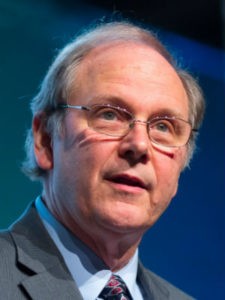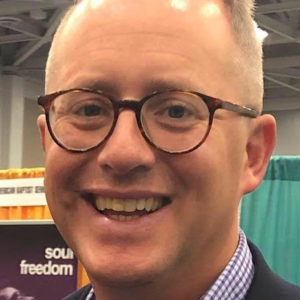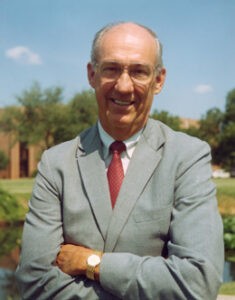Jesse C. Fletcher Seminary in San Antonio is an exciting place for women and men to prepare for Christian ministries of many kinds. The young seminary — whose core values are servant leadership, authentic community, engagement and inclusivity — extends the excellence of its “mother institution,” Logsdon Seminary.
Logsdon was founded at Hardin-Simmons University in 1996 through the vision and energy of its chancellor, Jesse C. Fletcher, but was abruptly closed by a secret vote of the trustees in 2019.

Robert Sellers
While Logsdon’s faculty members were people of outstanding training, enviable skill, wide-ranging experience and impeccable integrity, some influential fundamentalist and conservative Baptists from West Texas, as well as certain university trustees, considered them too liberal.
Logsdon’s support of women’s calling to all pastoral roles certainly had been problematic for many of these critics, as had the school’s expanding focus on global appreciation and interreligious dialogue.
But it was the Logsdon faculty’s refusal to adopt an anti-LGBTQ position that most angered several prominent opponents, who were able to convince the university trustees of the theological dangers Logsdon posed. This led to its tragic closure — and the shattered dreams and educational plans of current and future students and the disrupted lives of faculty and staff.
Plans for a new seminary
As early as 2020, plans for a new seminary — one that would honor the legacy of Logsdon — were being discussed. When Fletcher Seminary taught its first classes in 2022, it already had established itself as a progressive, creative venture.
“When Fletcher Seminary taught its first classes in 2022, it already had established itself as a progressive, creative venture.”
Conservative trustees no longer were a barrier to realizing at least two of Fletcher Seminary’s dreams, which had circulated around Logsdon but never could have been fulfilled.
The first certainly is becoming an ecumenical seminary with a faculty, staff and student body that represents many different denominational homes within the Christian faith. The second presents a greater public relations gamble but is grounded upon profound convictions about how Jesus would respond to our fragmented and highly judgmental Christian milieu — namely, a commitment to educate and employ people of all races, ethnicities, nationalities, creeds, denominations, genders, ages, disabilities and sexual orientations.
LGBTQ inclusion
Accordingly, Fletcher has situated itself as a multi-denominational seminary that also is broadly inclusive, open to training or employing anyone called to ministry in the world. As the only seminary in Texas with strong Baptist roots that self-identifies as welcoming and affirming of LGBTQ people, Fletcher occupies a special niche in theological education not only for progressive Christians of all backgrounds but also for people who may have felt marginalized in other settings.
Fletcher Seminary’s newest evidence of its commitment to the LGBTQ community is its acceptance as a member of the Association of Welcoming and Affirming Baptists, or AWAB. While many churches, organizations and individuals are affiliated, Fletcher is the first educational institution to be accepted as a member of AWAB, whose mission is “to create and support a community of churches, organizations and individuals committed to the inclusion of lesbian, gay, bisexual and transgender persons in the full life and mission of Baptist churches.”
“Fletcher is the first educational institution to be accepted as a member of AWAB.”
AWAB Executive Director Brian Henderson, an American Baptist minister, praised the AWAB-Fletcher partnership.
“Historically, AWAB has partnered with congregations and ministries that provide welcoming and affirming spaces for LGBTQ people,” Henderson said. “Recognizing the ever-evolving shifts within this work, AWAB seeks to create relationships and partnerships with institutions such as colleges, seminaries and divinity schools.

Brian Henderson
“AWAB is delighted to welcome the Jesse C. Fletcher Seminary as its first official education partner. We look forward to doing together what none of us can do on our own. The prospect of helping education partners impact, positively and affirmingly, LGBTQ+ individuals and to proudly introduce LGBTQ individuals to a school like Fletcher Seminary is in line with AWAB’s current strategic plan.”
Scott W. Green, an AWAB trustee and member of Broadway Baptist Church in Fort Worth, sees affinities between Fletcher Seminary and AWAB.
“When I reflect on the mission of the Association of Welcoming and Affirming Baptists and Fletcher Seminary, their core values easily overlap,” he said. “Organizations like these have a profound, positive impact, … (showing) that being gay and loving God are not mutually exclusive, and (helping) to build a spiritual community.
“I believe this affiliation will (enable) both organizations to strengthen an ever-widening community — one that seeks a place to freely serve God and live open, honest lives.”
Fletcher Seminary’s membership in AWAB was received enthusiastically, noted the school’s board chair, Stephanie Schreiner Nash, a retired pastor who served Second Baptist Church in Lubbock, Texas, 19 years.
“The Fletcher board was so eager to join the AWAB team that we immediately approved the motion to become a sponsor, which triggered an energetic conversation about what other organizations we should support,” Nash said. “It’s not that we have that much money to spread around; it’s a matter of finding joy in welcoming like-minded Christians on the journey to becoming the body of Christ in very real and tangible ways.”
Seminary President Dan Stiver also expressed excitement about the pairing.
“I am so pleased that Fletcher Seminary became approved as AWAB’s first educational partner but more importantly that Fletcher can be a safe, healthy place for theological education for all those associated with AWAB,” Stiver said.
Supporting students
Yet as much as administrators and trustees from both entities celebrate the collaboration of Fletcher and AWAB, Fletcher’s main concern — as with all educational institutions — is how the new identity affects its students. Two students reflect the thinking of many others.
“Fletcher’s affiliation demonstrates a commitment to our calling as Christians to embrace one another, loving our neighbors as ourselves.”
“Fletcher’s affiliation demonstrates a commitment to our calling as Christians to embrace one another, loving our neighbors as ourselves,” noted Thomas Bradshaw, who already had a master of social work degree and is about to earn a master of arts in religion.
“As a multi-denominational seminary grounded in Baptist roots, Fletcher serves as a safe space for theological exploration and growth, where students can mature into our vocations, regardless of the way God made us,” Bradshaw added.
“I enrolled with Fletcher seeking a progressive theological education to complement my prior learning as a social worker, where it is my job to work with people from countless backgrounds, helping them address their challenges, reach their goals and ultimately improve their quality of life,” he said. “I continue to be blessed by the opportunities I have been given in my studies with Fletcher, and I pray the seminary will continue to serve others in the same way, embracing all of our siblings in Christ as they are, for who they are.”
Fletcher likewise meets the needs of Marian Carmichal, a Presbyterian pastor who already earned a master of divinity degree from Union Seminary in Richmond, Va., before entering Fletcher.
“Fletcher Seminary has provided me the opportunity to take classes for continuing education with people from diverse backgrounds — geographically, theologically and socially,” she said. “It has been a privilege to learn alongside members of the LGBTQ community.
“I am thankful to Fletcher Seminary for providing a safe space for all people to learn together, to discuss hard topics and to share perspectives that others may not have considered. I applaud Fletcher Seminary’s acceptance as the first institutional member of AWAB.”
A proud trustee
As a trustee of Fletcher Seminary, I am proud of its decision to stand in solidarity with members of the LGBTQ community. Some Baptists, in Texas and beyond, will not understand Fletcher’s motives or agree with this new relationship and may criticize our leadership. That is disappointing. I have long believed the word “affirming” in the label “welcoming and affirming” means affirming others as beloved children of God, made in God’s image as equal members with us in the human family.
“As a trustee of Fletcher Seminary, I am proud of its decision to stand in solidarity with members of the LGBTQ community.”
I do indeed believe Jesse C. Fletcher would identify himself as “welcoming and affirming.” That is because of how long and well I knew him and who I understood him to be.
I met Jesse in 1968, at my Journeyman missionary orientation. I was preparing to go for two years to Indonesia and was one of almost 50 college-graduate young adults assigned to different countries to work alongside career missionaries.

Jesse Fletcher
The life-changing program, sometimes referred to as a “Baptist Peace Corps,” was the dream and creation of Fletcher. He brought it to reality in 1965, when he was director of missionary personnel for the Foreign Mission Board of the “old” Southern Baptist Convention.
When my wife and I returned from our Journeyman assignments — she from Colombia in 1971 and I from Indonesia in 1970 — we often were invited to participate in Foreign Missions Week plenary programs at Ridgecrest and Glorieta conference centers, especially after we married in 1972.
During the years before we left for our own 25-year missionary career in Indonesia in 1975, we often socialized at those summer missions gatherings with Jesse and Dot Fletcher and their children. In some ways, he was like an older brother to me — one I didn’t get to see very often, yet who was consistently interested in my life, supportive of my choices and engaging with my theological ideas.
It was Jesse, after he had retired as president of Hardin-Simmons University and was serving as the university chancellor, who recommended me to become the Connally Professor of Missions at HSU’s Logsdon Seminary.
Gratefully, we were in the same city and church with Jesse for the last years of his life. We visited Jesse and Dot in their home — and eventually spent time with him in his assisted living facility. Jesse’s passing was a sad occasion for hundreds of his friends, but it was a profound celebration of one dedicated to serving God’s mission in the world.
I am confident that Jesse, were he still living, would be so honored by a seminary that bears his name and honors his values and passions. I believe he would also support Fletcher Seminary’s commitment to ecumenism and diversity.
The Jesse Fletcher I knew and admired would stand alongside Fletcher’s LGBTQ faculty, staff and students and declare: “Welcome in the name of Jesus Christ, who loves each of you unequivocally and unconditionally. Without reservation, I affirm you as my brothers and sisters whom I love.”
The concluding statement in Fletcher’s 2021 obituary summarizes why he would be so proud of this seminary for its courageous action of inclusivity — one that for Baptist institutions is truly too long in coming: “Jesse Fletcher lived an extraordinary life. He believed that a key to life was to approach any opportunity or experience by replacing the word ‘Someday,’ with the word ‘Today.’”
To imagine Jesse applauding this partnership is wonderful. But for Fletcher Seminary to hear, “Well done, good and faithful servant,” from Jesus himself certainly makes risking criticism to act Christianly the right choice.
Rob Sellers is professor of theology and missions emeritus at Hardin-Simmons University’s Logsdon Seminary in Abilene, Texas. He is a past chair of the board of the Parliament of the World’s Religions in Chicago. He and his wife, Janie, served a quarter century as missionary teachers in Indonesia. They have two children and five grandchildren.
Related articles:
New Texas seminary renamed to honor Jesse Fletcher
Fletcher Seminary launches this fall, offering 2 graduate ministry degrees
Stiver named president of Fletcher Seminary


